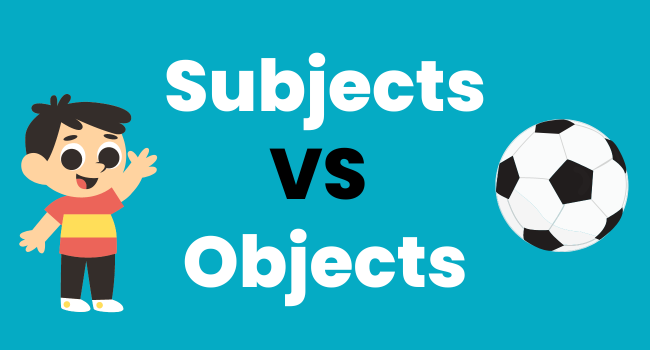
In this lesson, we’re going to talk about the difference between subjects and objects in basic English sentences. It is important to identify the subject of a sentence so you know who or what the sentence is about.
What are Subjects and Objects?
The subject of a sentence is the person or thing that is doing the action.
The object of a sentence is the person or thing that is receiving the action.
Examples:
- The boy ate the cake.
- The boy = subject
- The cake = object
- Kent kicked the ball in the park.
- Kent = subject
- The ball = object
Subjects in Detail
The subject is the noun or pronoun that performs the action in a sentence. A noun is a person, a place, or a thing. The subject usually comes before the verb in a sentence. Identifying the subject helps us understand who or what the sentence is about.
Examples:
- The cat climbs the tree.
- Subject: The cat
- Mary is studying for her exams.
- Subject: Mary
- They are watching a movie at the cinema.
- Subject: They
- It is a beautiful day.
- Subject: It
Objects in Detail
The object is the noun or pronoun that receives the action in a sentence. The object usually comes after the verb in a sentence. Identifying the object helps us understand to whom or what the action is being done to.
Examples:
The cat climbed the tree. Object: The tree
She bought a book at the bookstore. Object: Book
They invited us to the party. Object: Us
She loves him deeply. Object: Him
Sentence Structure: Subject-Verb-Object
The subject-verb-object sentence structure is a common pattern used in English sentences. It follows the order of subject, verb, and object.
Examples:
- The cat chased the mouse.
- Subject: The cat, Verb: Chased, Object: The mouse
- My parents are having dinner.
- Subject: My parents, Verb: Are having, Object: Dinner
- He wrote a letter.
- Subject: He, Verb: Wrote, Object: A letter
- The girls are building a sandcastle.
- Subject: The girls, Verb: Are building, Object: A sandcastle
English Grammar Quiz: Identify Subjects and Objects
Now, let’s put your knowledge to the test with a quiz. Identify the subjects and objects in the following sentences:
- We visited the museum last weekend.
- Kim is playing the piano.
- My niece painted a beautiful picture.
- The dog barked loudly.
- Dad is washing the dishes.
- The children ate the cookies.
Watch my lesson on Subjects VS Pronouns on Sparkle English to see the answers to this quiz!

Leave a Reply